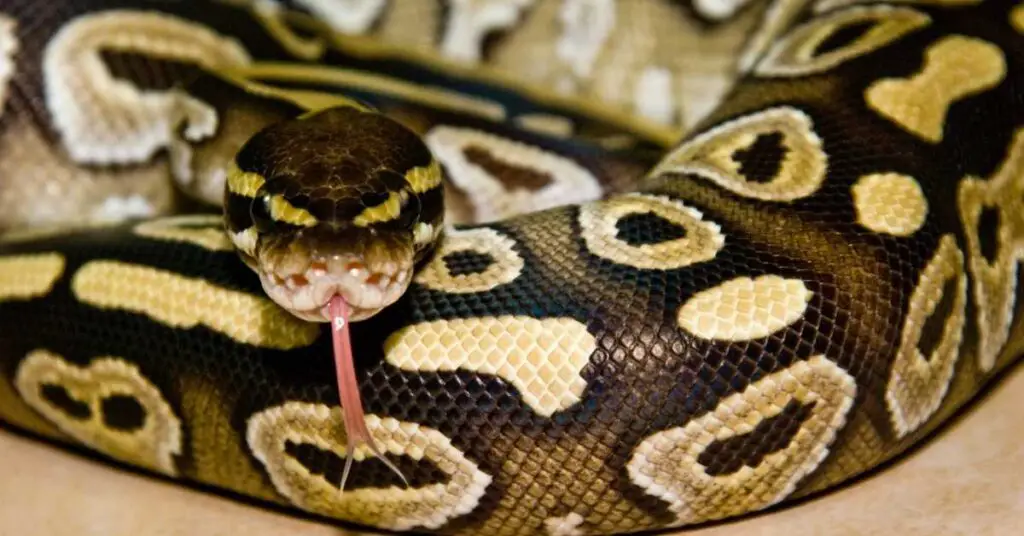Oh, you’ve heard the terrifying tales of the ferocious ball python, haven’t you? Well, let’s just say that it’s time to separate fact from fiction.
While some may argue that ball pythons are dangerous creatures, it’s essential to approach this topic with a balanced perspective. After all, there’s more to these slithering serpents than meets the eye.
So, buckle up and prepare to explore the intriguing world of ball pythons, their behavior, and the potential risks they may pose. But be warned, you might be in for a few surprises along the way.
Key Takeaways
- Ball pythons are generally docile and have a mild temperament, making them not inherently dangerous.
- Accidents can occur during handling due to their size and strength, so it’s important to handle them with care and support their head and neck to prevent injury.
- Constriction by large and powerful pythons can pose a serious risk, and it’s crucial to be cautious when interacting with them.
- Legal restrictions on owning ball pythons may exist in certain locations, so it’s important to be aware of and comply with local laws.
Natural Behavior of Ball Pythons
Ball pythons exhibit a range of natural behaviors that are important to understand for their proper care and handling. Understanding their hunting patterns and social interactions can help create an environment that promotes their well-being and allows them to thrive.
In the wild, ball pythons are ambush predators, relying on their excellent camouflage to hide and wait for their prey to come close enough for them to strike. Their hunting pattern is characterized by patience and stealth, as they remain still for long periods until an opportune moment arises.
Socially, ball pythons are generally solitary animals, preferring to live alone except during the breeding season. However, they do engage in social interactions with other pythons, particularly during mating rituals. During this time, male ball pythons will engage in courtship behavior, such as rubbing their chin on the female’s body or intertwining their bodies. These interactions are essential for successful reproduction and the continuation of the species.
Understanding these natural behaviors is crucial for providing appropriate care for ball pythons in captivity. Mimicking their natural hunting patterns by providing hiding spots and opportunities for ambush can help alleviate stress and promote their natural instincts. Additionally, providing opportunities for social interactions, such as allowing for controlled introductions during breeding season, can contribute to their overall well-being.

Handling and Temperament of Ball Pythons
When handling ball pythons, it’s important to understand their temperament and how to safely interact with them. These snakes have a generally docile nature, but they can still display defensive behavior if they feel threatened. Here are some key points to consider when handling ball pythons:
- Respect their space: Give your ball python time to acclimate to its new surroundings before attempting to handle it. This will help reduce stress and increase the chances of a calm interaction.
- Use proper handling techniques: Support the snake’s body fully, keeping it close to the ground or a stable surface. Avoid sudden movements or loud noises that may startle the python.
- Be aware of body language: Learn to read your python’s body language. Signs of stress or discomfort include hissing, lunging, and coiling tightly.
- Gradual training techniques: If your ball python is particularly skittish or anxious, gradual training techniques can help build trust and confidence over time. This may involve short handling sessions and positive reinforcement.
- Health concerns: Regularly monitor your python’s health and look for signs of illness or injury. Consult a reptile veterinarian if you notice any abnormalities.
Potential Risks Associated With Ball Pythons
Potential risks are associated with handling ball pythons due to their size and strength. While ball pythons are generally docile and non-aggressive, accidents can still occur during handling. One of the health concerns for ball pythons is the risk of bites. Although they aren’t venomous, their bites can be painful and may cause bleeding. Additionally, ball pythons have the ability to constrict their prey, and although rare, there have been cases where owners have been constricted by their pet pythons. This can pose a serious risk, especially if the snake is large and powerful.
It’s important to note that there may also be legal restrictions on owning ball pythons, depending on your location. Some countries or states have specific regulations regarding the ownership of certain species of snakes, including ball pythons. These regulations are put in place to protect both the snakes and the public. It’s crucial to check and comply with the local laws and regulations before considering owning a ball python.
While the risks associated with ball pythons can be mitigated through proper handling techniques and precautions, it’s important to be aware of these potential risks. By understanding the health concerns and legal restrictions, you can make informed decisions and ensure the safety and well-being of both yourself and your pet ball python.
Safety Measures for Owning Ball Pythons
To ensure the safety of both yourself and your pet ball python, it’s essential to implement proper safety measures when owning these reptiles. Here are some important steps to follow:
- Snake enclosure: Provide your ball python with a secure and spacious enclosure. A glass terrarium with a secure lid is recommended to prevent escapes. Ensure the enclosure has appropriate temperature and humidity levels, as well as hiding spots and climbing branches for your snake to feel secure.
- Feeding schedule: Establish a regular feeding schedule for your ball python. Feed them appropriately sized prey, such as mice or rats, once every 1-2 weeks. It’s crucial to monitor their weight and adjust the prey size accordingly to prevent obesity or malnutrition.
- Handling with care: When handling your ball python, be gentle and avoid sudden movements. Support their body properly, especially their head and neck, to prevent injury. Always wash your hands before and after handling to prevent the spread of bacteria.
- Safe environment: Keep your ball python’s enclosure away from drafts, direct sunlight, and excessive noise. Ensure that any equipment, such as heating devices or lights, are securely positioned to prevent accidental burns or electrical hazards.
- Educate yourself: Stay informed about proper ball python care by reading reliable sources, consulting with experienced reptile owners, or seeking guidance from a reptile veterinarian. Continuously learning and staying updated on best practices will help ensure the wellbeing and safety of your pet ball python.
Common Myths About Ball Pythons
There are several common myths surrounding ball pythons that can lead to misconceptions about their behavior and care requirements.
One common myth is that ball pythons are dangerous and pose a significant health risk. In reality, ball pythons are generally docile and have a mild temperament. While they do have the potential to bite, their bites are usually not dangerous and rarely result in serious injury. It’s important, however, to handle them with care and respect, as they may become stressed or defensive if mishandled.
Another myth is that ball pythons require complex and specialized care. While it’s true that ball pythons have specific needs, they aren’t overly difficult to meet. They require a suitable enclosure with proper heating and humidity levels, as well as a balanced diet consisting of appropriately sized prey. Contrary to popular belief, ball pythons don’t need constant handling and can thrive in a calm and secure environment.
Breeding habits are another area where misconceptions exist. Some people believe that ball pythons are aggressive breeders and may harm each other during the mating process. In reality, ball pythons typically engage in mating rituals that involve gentle nudging and coiling. It’s rare for them to cause harm to one another, and proper enclosure setup can minimize any potential risks.
Frequently Asked Questions
What Is the Average Lifespan of a Ball Python in Captivity?
On average, ball pythons can live for about 20 to 30 years in captivity. Providing proper care requirements such as a suitable enclosure, appropriate temperature and humidity levels, and a balanced diet can contribute to their longevity.
Do Ball Pythons Require a Heat Lamp or Can They Rely Solely on Ambient Room Temperature?
Ball pythons require a heat lamp or suitable heat sources to maintain the proper temperature in their enclosure. While they can tolerate ambient room temperature, replicating their natural habitat temperature is essential for their overall well-being.
Can Ball Pythons Be Kept Together in the Same Enclosure?
Yes, ball pythons can be kept together in the same enclosure, but it is not recommended due to potential aggression and stress. It’s best to provide individual enclosures with proper feeding habits and substrate options.
Are Ball Pythons Prone to Any Specific Health Issues or Diseases?
Ball pythons can be prone to various health issues and diseases, such as respiratory infections, scale rot, and mites. It is important to provide proper husbandry, regular veterinary check-ups, and a clean environment to ensure their well-being.
What Are Some Common Signs of Stress or Discomfort in Ball Pythons?
Common signs of stress in ball pythons include decreased appetite, excessive hiding, frequent attempts to escape, and defensive behavior. To create a comfortable environment, provide proper temperature and humidity levels, ample hiding spots, and a secure enclosure.
Conclusion
In conclusion, while ball pythons may have the potential to pose risks due to their natural behavior and handling, they’re generally not dangerous. By understanding their behavior, providing proper handling and care, and implementing safety measures, the risks associated with owning ball pythons can be minimized.
It’s important to separate facts from common myths and approach the topic objectively to ensure a clear understanding of the nature of these snakes.

